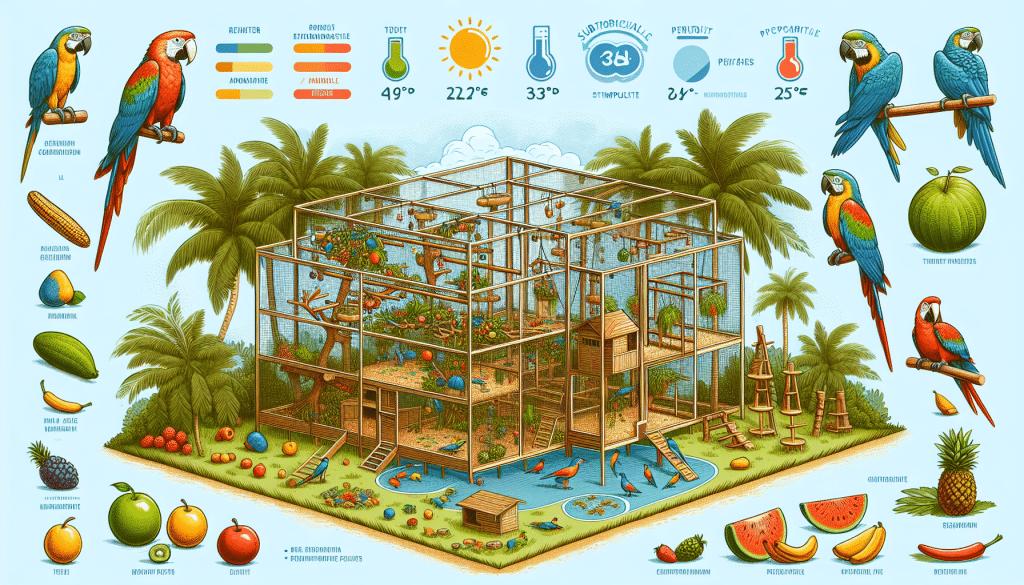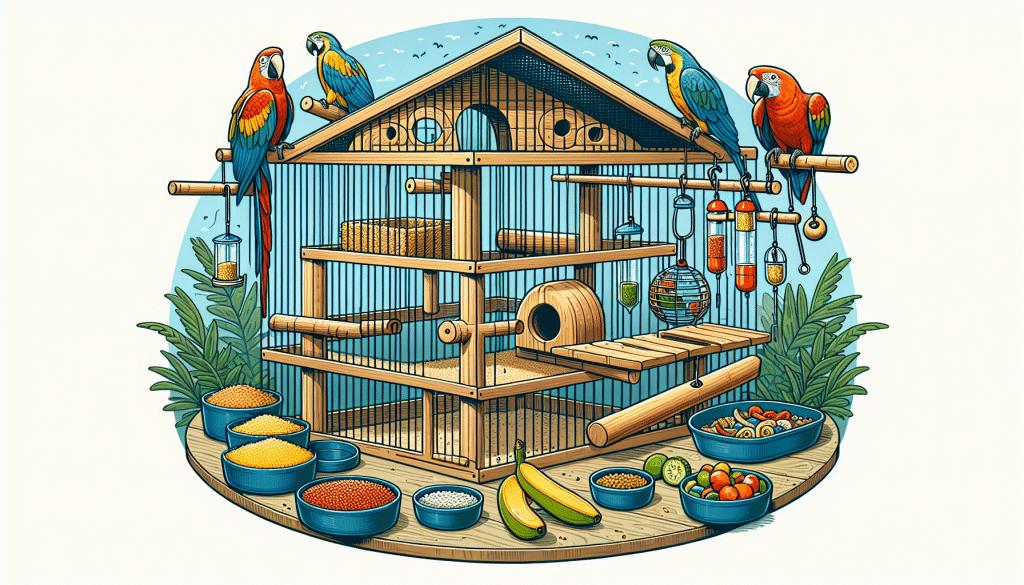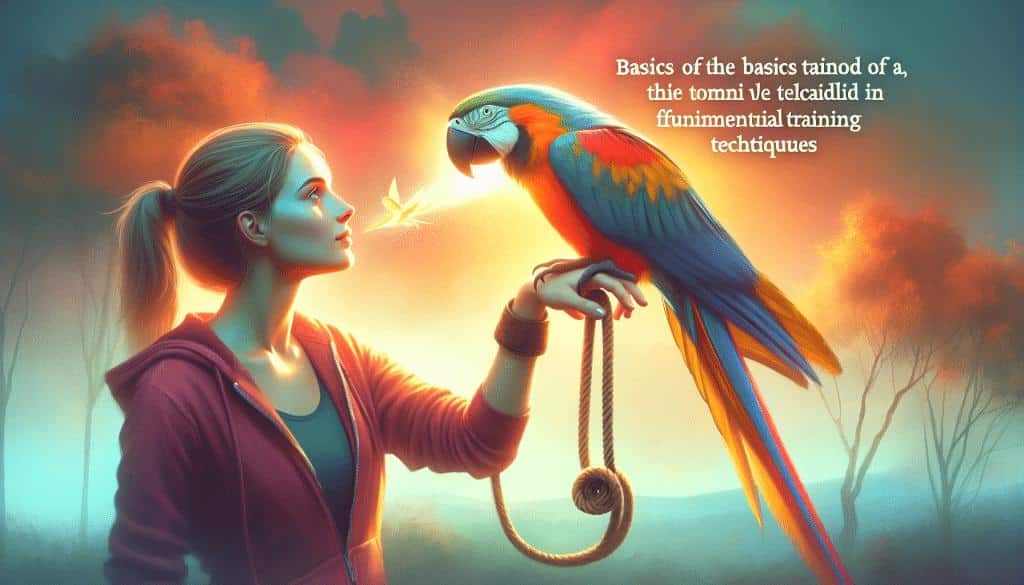In order to provide a suitable habitat for macaws, it is crucial to understand the unique needs and characteristics of these magnificent bird species. This article explores the essential elements required to create an environment that caters to the physical, behavioral, and psychological requirements of macaws. By focusing on factors such as cage size, diet, socialization, enrichment, and environmental stimulation, individuals can contribute to the well-being and conservation of macaws in captivity. Achieving an optimal habitat setup for macaws not only enhances their quality of life but also nurtures their natural instincts and promotes their long-term health and happiness.

Understanding Macaw Species and Their Specific Needs
Macaws are known for their vibrant colors and impressive size, making them a popular choice among bird enthusiasts. However, it is crucial to understand the different species of macaws and their specific needs in order to provide them with an optimal living environment.
Differentiating between Macaw species
There are several macaw species, including the Blue-and-Gold Macaw, Scarlet Macaw, Green-winged Macaw, and Hyacinth Macaw, among others. Each species has its own unique characteristics, such as size, coloration, and temperament. It is important to research and familiarize yourself with the specific characteristics of the macaw species you plan to care for, as this will help you meet their individual needs more effectively.
Natural habitats of various Macaw species
Macaws are naturally found in Central and South America, primarily in the rainforests. These lush habitats provide the macaws with ample space to fly, a variety of foods to forage, and social interactions with other macaws. Understanding the natural habitats of various macaw species is essential for creating a suitable environment that mimics their native surroundings.
Physical and behavioral needs of Macaws
Macaws are highly intelligent and active birds, requiring mental and physical stimulation on a daily basis. They love to chew, climb, and explore their surroundings. Providing ample opportunities for exercise and mental enrichment is crucial for their well-being. Additionally, macaws need a balanced diet that consists of fresh fruits, vegetables, nuts, and seeds to maintain their overall health.
Basics of Creating a Macaw-Friendly Environment
Creating a macaw-friendly environment involves considering various factors to ensure the well-being of these magnificent birds. From spatial requirements to environmental conditions, each element plays a crucial role in providing a comfortable and suitable habitat for macaws.
Space requirements for Macaws
Macaws are large birds that require a spacious enclosure to freely move around and exercise their wings. The minimum recommended size for a macaw enclosure is a cage that measures at least 3 feet wide, 4 feet deep, and 5 feet high. However, providing the largest possible space within your means is highly beneficial for the macaw’s physical and mental health.
Importance of natural sunlight and fresh air
Natural sunlight and fresh air are essential for macaw health and well-being. Exposure to sunlight helps macaws synthesize vitamin D, which is vital for calcium absorption. Additionally, fresh air circulation aids in maintaining proper respiratory health for these birds. Positioning the macaw enclosure near a window or installing full-spectrum lighting can help replicate natural sunlight. However, it is crucial to ensure that the enclosure is not exposed to drafts or excessive heat.
Temperature and humidity control
Macaws originate from tropical regions and are accustomed to warmer temperatures. Maintaining an appropriate temperature range between 70 to 80 degrees Fahrenheit (21 to 27 degrees Celsius) is ideal for their comfort. Similarly, macaws thrive in environments with moderate humidity levels between 40% to 60%. Using a thermometer and hygrometer can help monitor and regulate temperature and humidity levels inside the enclosure.

The Essentials of a Macaw Enclosure
Choosing the right enclosure for a macaw is vital for their safety, comfort, and overall well-being. A well-designed enclosure provides the macaw with ample space to move and exercise while ensuring their security and preventing any potential hazards.
Choosing the right enclosure
When selecting an enclosure for a macaw, it is essential to opt for one made of strong and durable materials, such as stainless steel or wrought iron. These materials are resistant to chewing and provide ample security. The bars of the enclosure should be appropriately spaced to prevent the macaw from getting stuck or escaping.
Safety features in Macaw cages
Macaws are known for their strong beaks and powerful chewing abilities. Therefore, it is crucial to ensure that the cage has secure locks and latches to prevent the macaw from opening them. Additionally, the enclosure should be free from any toxic materials, such as lead-based paints or zinc-coated accessories, as macaws are highly sensitive to toxins.
Making the enclosure escape-proof
Macaws are curious birds and may attempt to escape if they perceive an opportunity. To make the enclosure escape-proof, it is important to examine it thoroughly for any potential gaps or weaknesses. Reinforcing corners, ensuring secure door hinges, and using appropriate locking mechanisms can help prevent the macaw from escaping and any potential injuries.
Furnishing the Habitat: Perches and Toys
Furnishing the macaw habitat with suitable perches and toys is vital for their physical and mental well-being. Macaws require a variety of perches to exercise their feet and provide different textures for their beaks. Similarly, providing them with stimulating toys helps prevent boredom and encourages natural behaviors.
Types of perches and their placement
Macaws require perches of various sizes and textures to exercise their feet and prevent foot-related issues. Natural wood perches of different diameters and shapes, such as branches or dowels, help promote foot health and provide a more natural environment. Placing perches at different heights and angles within the enclosure encourages macaws to navigate their environment and exercise their wings.
Providing safe and stimulating toys
Macaws are intelligent and playful birds that require mental stimulation to thrive. Providing a variety of safe and durable toys, such as puzzle toys, foraging toys, and chew toys, helps keep them mentally engaged and prevents boredom. Toys made from non-toxic materials, such as hard plastics or untreated wood, are ideal for macaws as they can be safely chewed and manipulated.
Rotation of toys to prevent boredom
Macaws are quick to become bored with repetitive toys, so regularly rotating their toys keeps them engaged and prevents monotony. Introducing new toys and rotating them every few days helps maintain the macaw’s curiosity and prevents destructive behaviors that may arise from boredom. Additionally, inspecting toys regularly for wear and tear and replacing them when necessary ensures the macaw’s safety.

The Importance of Social Interaction
Macaws are highly social birds that thrive on social interaction and companionship. Providing ample social time and opportunities for bonding is crucial for their mental and emotional well-being.
Integrating social time in Macaw’s daily schedule
Allocating dedicated social time in a macaw’s daily schedule is essential for meeting their social needs. Spending time with your macaw through activities like talking, singing, or training helps establish a bond and promotes cognitive development. Aim for at least one to two hours of quality social interaction with your macaw every day.
Human interaction and bonding
Macaws are known for their ability to form strong bonds with their human companions. Regular positive interactions, such as talking, singing, or simply being present near the macaw, help build trust and strengthen the bond. Physical contact, such as gentle petting or head scratches, can also be introduced gradually, based on the macaw’s level of comfort.
Introducing other Macaws or birds safely
While macaws can form strong bonds with humans, they are also capable of forming bonds with other macaws or birds. Introducing another macaw or bird to provide companionship requires careful consideration and supervised interactions. A gradual and controlled introduction process, with separate enclosures initially, allows macaws to establish a positive relationship while ensuring their safety.
Diet and Nutrition: Feeding Your Macaw Properly
Providing a balanced diet is crucial for the overall health and longevity of macaws. A nutritionally complete diet ensures that macaws receive the necessary nutrients to thrive and maintain optimal health.
Components of a balanced Macaw diet
A balanced macaw diet consists of a combination of formulated diets, fresh fruits and vegetables, nuts, and seeds. High-quality formulated pellets specifically designed for macaws serve as the foundation of their diet, providing essential vitamins and minerals. Fresh fruits and vegetables should be offered daily, providing a variety of colors and nutrients. Nuts and seeds, offered in moderate quantities, serve as a source of healthy fats and additional stimulation.
Feeding schedule and portion sizes
Establishing a consistent feeding schedule is important for macaw health and digestion. Generally, macaws should be provided with fresh food in the morning and evening, with dry food available throughout the day. Portion sizes should be based on the macaw’s size and activity level, ensuring they consume an appropriate amount without excessive weight gain. Regularly monitoring the macaw’s weight and adjusting portion sizes accordingly is crucial for maintaining their health.
Supplements and treats for Macaws
While a balanced diet should provide most of the essential nutrients, macaws may require additional supplementation in certain cases. Including avian-specific multivitamin and mineral supplements can help ensure that they receive all the necessary nutrients. Treats should be offered in moderation and limited to healthy options, such as natural fruit or nut-based treats. Care should be taken to avoid offering treats that are high in sugar, salt, or unhealthy fats.
Exercise and Activities for Physical Health
Physical exercise is vital for the overall well-being of macaws. Regular exercise helps maintain their muscle tone, cardiovascular health, and mental stimulation.
Importance of daily exercise
Macaws are naturally active birds and require daily exercise to maintain their physical health. Encouraging them to engage in activities such as flying, climbing, or walking outside the enclosure helps stimulate their muscles and promotes overall physical fitness. Providing ample opportunities for exercise prevents obesity and other related health issues.
Flight time and wing-flapping activities
Since macaws are excellent fliers, it is important to allow them time and space to exercise their wings. Allocating a safe and secure area, such as an aviary or a bird-proofed room, where the macaw can fly freely helps satisfy their natural instincts. Flight time should be supervised to ensure their safety and to prevent any potential accidents.
Interactive games and training
In addition to flight exercise, interactive games and training sessions are beneficial for macaw mental stimulation and physical health. Incorporating simple training exercises, such as teaching them tricks or target training, helps engage their cognitive abilities. Interactive toys and games, such as puzzle toys or treat-dispensing toys, keep them mentally active and prevent boredom.
Maintaining Cleanliness in the Habitat
A clean habitat is essential to ensure the health and well-being of macaws. Regular cleaning and maintenance prevent the buildup of harmful bacteria, parasites, and odors.
Regular cleaning schedule
Establishing a regular cleaning schedule is crucial for maintaining cleanliness in the macaw habitat. Daily tasks include removing any uneaten food, cleaning the water bowls, and spot-cleaning any waste or debris. Weekly tasks involve thoroughly cleaning the enclosure, including the perches, toys, and cage accessories. This helps remove any accumulated debris or droppings that may harbor bacteria.
Safe and effective disinfectants
Using safe and effective disinfectants helps maintain a hygienic environment for macaws. Choosing bird-safe disinfectants that are specifically formulated for avian environments is essential to avoid any potential harm. Diluting the disinfectant as recommended and thoroughly rinsing off any residues ensures the safety of the macaw.
Managing waste and droppings
Proper waste management is essential for maintaining cleanliness and preventing potential health hazards. Using appropriate lining materials, such as newspaper or absorbent bedding, helps absorb moisture from droppings and simplifies cleaning. Regularly removing and disposing of waste is crucial to prevent bacterial growth and maintain a healthy habitat for macaws.
Protecting Macaws from Hazards
Macaws are curious birds, and their inquisitive nature can sometimes expose them to potential hazards within their environment. Identifying and mitigating common household hazards is essential to ensure their safety and well-being.
Common household hazards for Macaws
Macaws are susceptible to various household hazards, including toxic plants, chemical substances, open electrical cords, and small objects that can be swallowed. It is important to identify and remove any potential hazards from the macaw’s environment to prevent injuries or toxic exposure.
Preventing toxic exposure and injuries
Toxic exposure can have severe consequences on the health of macaws. Ensuring the enclosure is free from toxic plants or chemicals is important. Additionally, securing open electrical cords, covering sharp edges, and carefully monitoring interaction with small objects helps prevent injuries. Macaws should also be kept away from insecticides, cleaning agents, or any other toxic substances used in households.
Emergency preparedness for Macaw owners
Preparing for emergencies is crucial for the safety of macaws. Being aware of the location and contact information of avian veterinarians is important in case of a health emergency. Additionally, having a well-stocked first aid kit specifically designed for avian emergencies can help provide immediate care until professional help is available. Creating an emergency evacuation plan and addressing potential risks can help minimize harm in the event of a natural disaster or unforeseen circumstances.
Long-Term Commitment to Macaw Care
Macaws are long-lived birds, and their care requires a long-term commitment. Understanding their lifespan, planning for their future care, and considering the financial implications of maintaining a proper habitat are vital aspects of responsible macaw ownership.
Life-span considerations for Macaw owners
Macaws are known for their long lifespans, with some species living up to 80 years or more. Owners should be prepared for the long-term commitment associated with macaw ownership. Understanding the potential challenges and changes that can occur over time helps ensure that macaws receive consistent care throughout their lives.
Succession planning for Macaw care
Planning for the future care of macaws is important, especially considering that they may outlive their owners. Establishing a succession plan that includes identifying responsible caregivers or organizations willing to continue the macaw’s care is crucial. Ensuring that potential caregivers are knowledgeable about macaw care and willing to fulfill the responsibilities is essential for the macaw’s continued well-being.
Financial considerations for maintaining a proper habitat
Maintaining a proper habitat for macaws involves various ongoing expenses. From food and veterinary care to cage maintenance and enrichment, macaw ownership can be financially demanding. Considering these financial implications and planning for the long-term costs associated with macaw care ensures that the macaw’s needs are consistently met throughout its life.
In conclusion, providing a suitable habitat for macaws involves understanding their specific needs and creating an environment that mimics their natural surroundings. From choosing the right enclosure to furnishing it with perches and toys, every aspect plays a crucial role in ensuring the well-being of these magnificent birds. Regular social interaction, a balanced diet, exercise, and maintaining cleanliness are key elements in macaw care. Additionally, protecting macaws from hazards, planning for the long-term commitment, and considering financial considerations are fundamental aspects of responsible macaw ownership. By implementing these guidelines, macaw owners can create an environment where their feathered companions can thrive and live a healthy and fulfilling life.

